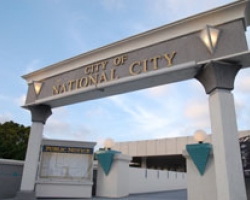Luz Molina, 45, is running to represent National City’s newly-formed district one which generally covers the west side of the city. Because she is running unopposed, Molina said her primary goals are less about what she might do in office and more about developing processes for district-based governance while working ahead and researching how to best fill her probable role.

“My first goal on council, because we’ve just gone through districting, will be to address how we insert this idea into day to day business. For example: do we identify agenda items and whether they represent a certain part of the city? Does that put greater emphasis on the districts and which district it mostly affects? I’ll be honing in on that idea,” Molina said.
Up until now, she said, she has served as a part-time elected city clerk so her duties have been minimized compared to full-time staff. However, they have included attending city council meetings, recording notes and drafting minutes, which she said has allowed her to learn quite a bit about city processes. With that in mind, her second goal on council would be to advocate for changing the role of city clerk from a part-time elected position to a full time staff position.
“I’m strongly behind measure M, which would remove the election for city clerk… that position needs to be a full time staff member; it doesn’t make any sense to continue being elected,” Molina said.
Prior to her time in office, Michael Dalla was reelected for two decades of service in her current position, she said, and did a very good job at what amounted to a full career. The city would be better served by a permanent hire, she said, rather than “someone who can win an election” but might not know the intricacies of maintaining records.
Her second goal would be to acknowledge complaints from residents and develop a better means of communication with constituents.
A third goal is harder, she said: addressing homelessness.
“I cannot ignore the homelessness affecting our region. We need to collaborate with agencies that are focusing on the problem, the root causes that have gotten us to this point,” Molina said, although she did not identify what projects might emerge from potential collaboration.
The city needs to promote affordable housing, she said by maximizing its land like it did with the Paradise Creek apartments which are “a great example” of unearthing land for housing in the small city.
“Another solution I want to work towards is making it easier for property owners to build on their land. I know from personal experience trying to build an Accessory Dwelling Unit how hard that is. Recently, my husband and I decided we wanted to have my mother live closer to us. The permitting process to convert our garage to a mini studio took 10 months. You should have seen what we went through— it was a checklist with an additional checklist. That’s a big setback,” Molina said, in a city that needs more places to live.
She would like city staff to be more “in tune” with simplifying the process for other members of the community and thinks the process could be made less expensive along the way.
In her full-time day job, Molina works as a contracts and grant officer for University of California San Diego where she manages the nonfinancial side of the federal grant cycle for the research university.
Although the city has a surplus in funding for the first time in ten years, she said, that is “ because of federal money that trickled down from COVID funding so it’s a one-time scenario” and although there are some good ideas at city hall, the missing link is having someone who can figure out how to get those ideas funded, something she hopes to change.
“I need to learn more about the city budget but I’ve worked with contracts and grants at UCSD and I’d love to see the city bring on a staff person dedicated to grant writing. There’s a lot of federal money we just aren’t going after and we could use a person dedicated to uncovering what grants are coming up and what funding is available,” Molina said.
When she worked on the Parks and Recreation committee, Molina said, there was “someone who would keep us abreast of grants” to do things like plant trees. Expanding that idea to develop a staff role for a grant writer would make fiscal sense for the city, she said.
Within district one, she would like to address the low air quality that side of the city is known for.
“I’m happy to say I’ve been endorsed by the Environmental Health and Justice Campaign that primarily looks at ways to improve air quality and promote environmental justice in places that are zoned for mixed use. Unfortunately, it’s not necessarily the business owners intending to cause harm but their work does pollute the air,” Molina said.
To rectify that, she is seeking insight from National City Port of San Diego representative Sandy Naranjo, Molina said, in an effort to align her western district with the Port’s approach to improving air quality along the bayfront.
Her district also includes the tourist and commercial zone where cannabis consumption was recently legalized with the first businesses currently moving through the permitting process.
“I’ve already been hearing from community members who have come up and said ‘oh my goodness, I’m very concerned for my neighborhood’ and I’m cognizant they’re not one hundred percent satisfied or dissatisfied. There has to be a balance. It’s going to require city hall ensuring the correct people are licensed and the police department helping to maintain the rules, for example, you can’t be out smoking on public property,” Molina said.
To further promote business development, Molina said she would like to focus on smaller businesses, especially those that survived the pandemic.
“I love that National City is rich with small businesses. I eat local, dine local, buy local and I’d like to keep our small businesses alive,” Molina said, in part by focusing on bringing in smaller, family-owned businesses over big-box stores.
At this point, Molina has completed two of the four years she was elected to serve as city clerk. When she is elected to the dais, she will be one of the city council members deciding how to restructure her former position if measure M passes and the job is transitioned to a staff role.
“Deputy City Clerk Shelley Chapel has her municipal city clerk certificate and she is well informed,” Molina said, having already thought ahead to how she will begin her days on city council.
She is a Sweetwater high school grad who earned her degree from University of California at Berkeley in Molecular Biology.















